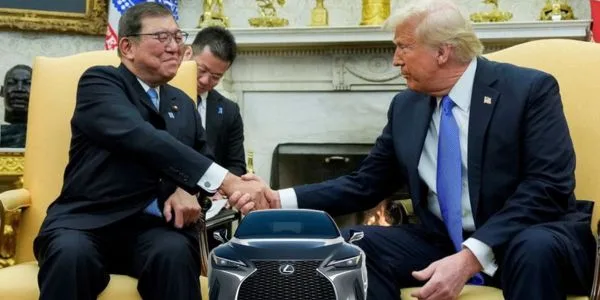Amid rising U.S.-Japan trade tensions, President Trump has threatened a 25% tariff on Japanese car imports by July 9, 2025. Japan pushes back, warning of economic disruption and rising U.S. car prices.
Washington, D.C. — In a move intensifying U.S.-Japan trade tensions, President Donald Trump has warned of a 25% tariff on Japanese car imports if a new trade agreement isn’t finalized by July 9, 2025.
Speaking on Fox News on June 29, Trump slammed the current trade balance as “unfair,” pointing to the millions of Japanese vehicles entering the U.S. compared to limited American exports to Japan.
“They send us millions of cars, but we can’t send ours there. It’s got to change,” Trump said, escalating U.S.-Japan trade tensions just days ahead of the negotiation deadline.

Must Read: Japan’s Historic Type-88 Missile Test Marks First on Hokkaido Soil
Auto Industry Caught in the Crossfire
The proposed 25% car import tariff, along with a possible increase in a separate “reciprocal” tariff from 10% to 24%, has raised alarms throughout the Japanese auto sector. The backdrop of U.S.-Japan trade tensions has already impacted the market — with Japan’s car exports to the U.S. dropping by 24.7% in value during May 2025.
Japanese trade officials warn that these moves could destabilize both economies. Chief negotiator Ryosei Akazawa called the threat “unacceptable,” highlighting the contributions of Japanese automakers to the U.S. economy.
“Companies like Toyota and Honda produce over 3.3 million vehicles in U.S. factories annually and support millions of American jobs,” Akazawa noted, framing the tensions as counterproductive.

Must Read: Global Economy at Crossroads: Inflation Fears Rise Amid Trade Tensions
Consumers Face a Hidden Tax
Amid growing U.S.-Japan trade tensions, experts caution that the biggest losers could be American car buyers. Analysts estimate that a 25% tariff could raise the cost of imported Japanese vehicles by approximately $2,000 each, acting as an indirect tax on U.S. consumers.
“These tariffs will increase car prices and could even slow down sales,” said Lisa Grant, a senior analyst at the Center for Automotive Research. “The pressure from U.S.-Japan trade tensions could shift how global supply chains function.”
Dealership associations across the U.S. are urging the White House to reconsider, noting that rising costs will also affect parts, services, and domestic dealership revenues.
Japan Seeks Exemption Amid Negotiations
Japan is now scrambling to avoid these tariffs through diplomacy. But Trump’s history of tough trade tactics suggests that U.S.-Japan trade tensions may only ease if Japan agrees to major concessions.
Trade analysts say Japan may offer expanded access for U.S. auto brands or regulatory reforms, though that remains uncertain. In previous years, Trump has used similar tactics with the EU and China to force revised deals.

A Turning Point in Global Trade
The ripple effects of this conflict could be felt far beyond Detroit or Tokyo. As U.S.-Japan trade tensions deepen, multinational automakers are reassessing global manufacturing hubs, sourcing routes, and investment plans.
Smaller Asian exporters are also watching closely — wary that they might be next in line for tariffs under Trump’s America-first trade vision.
Must Read: India Refuses to Sign SCO Joint Statement in China Over Terrorism Concerns
Countdown to July 9: High Stakes on Both Sides
With just days remaining, U.S.-Japan trade tensions have become the focal point of international economic discourse. Whether these negotiations result in a deal or a showdown, the outcome will influence global auto prices, supply chains, and the future of bilateral trade for years to come.
Stay with TheInterviewTimes.com for continued coverage of U.S.-Japan trade tensions and other major global developments.

